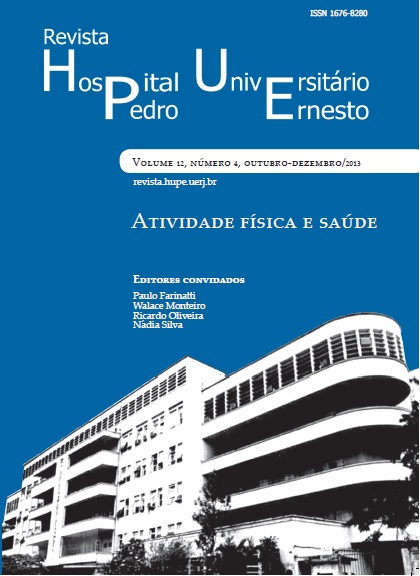Aspectos relevantes sobre a hidratação no esporte e na atividade física
DOI:
https://doi.org/10.12957/rhupe.2013.8712Resumo
Durante a prática de exercício físico – o responsável pela geração de calor independente de fatores externos –, o corpo busca a manutenção da temperatura corporal em torno de 37º C. Para que isto seja possível, o mecanismo de evaporação do suor é meio primário pelo qual o corpo busca manter sua homeostase. A magnitude da perda hídrica durante o exercício é dependente de fatores como a individualidade, as características da atividade física e as condições ambientais. Diante disso, a reposição de líquidos é essencial para a manutenção do desempenho e, principalmente, para garantir um funcionamento satisfatório do sistema cardiovascular. Neste contexto, a seleção de uma bebida para ser consumida durante o exercício com o objetivo de reposição dos fluidos corporais perdidos deve respeitar algumas características específicas para promover uma recuperação hidroeletrolítica e metabólica adequada. Para os distintos momentos do exercício (antes, durante e após a atividade) diferentes protocolos de consumo são recomendados. Além da água e dos repositores hidroeletrolíticos, outros produtos como glicerol, bebidas lácteas de baixo teor de gordura, bebidas energéticas e cerveja também têm sido estudadas na hidratação de atletas e pessoas fisicamente ativas. Para uma adequada reposição dos fluidos, além da seleção da bebida, é necessário que se faça uma avaliação do nível de desidratação, cujas técnicas podem variar em relação ao custo, portabilidade, tempo de execução e nível de precisão do método. Diante do exposto acima, o objetivo deste trabalho é, por meio de uma breve revisão, trazer aos profissionais envolvidos direta e indiretamente com a prescrição de exercícios físicos para diferentes populações conhecimentos fisiológicos que envolvam o processo de desidratação no exercício, bem como fornecer informações sobre os diferentes tipos de bebidas para a hidratação, métodos de avaliação do estado de hidratação e protocolos de hidratação antes, durante e após o exercício físico.
Descritores: Desidratação; Repositoreshidroeletrolíticos; Termorregulação.
Revista HUPE, Rio de Janeiro, 2013;12(4):47-58
doi:10.12957/rhupe.2013.8712


